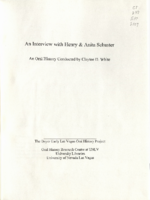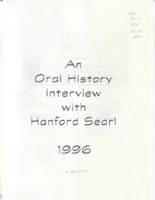Search the Special Collections and Archives Portal
Search Results

Transcript of interview with Martin, Linda, and Robert Wilner by Barbara Tabach, May 10 & 24, 2016
Date
Archival Collection
Description
During the early 1970s, the boom of Las Vegas included many single people following family who had already settled there. Among those was Martin (Marty) Wilner. Marty?s parents were Leo and Mickey Wilner. Leo moved to Las Vegas to become the Executive Director at Temple Beth Sholom, the only synagogue in town. Marty, who was born and raised in California, had recently earned his doctorate in psychology at the University of Houston. He became a counselor at UNLV. Not long after, Marty met Linda at a Jewish Singles event. Linda was a divorced, mother of three children, who had moved from California to find comfort in living near her parents. Robert Wilner is one of her three children. He was adopted by Marty and works with his mother in the real estate business. In this interview, they recall together the Las Vegas of the 1970s. For Robert, he remembers his bar mitzvah, and growing up with Jewish friends under the careful eye of his grandparents. As an adult, he has enjoyed a successful career as a real estate agents working with his mother. For Linda, the success of real estate was being part of one of the most robust housing markets in the country. She and Robert recall an extensive list of visionaries who developed the valley, as well as the inherent challenges of water, unions and maintaining their high level of ethics.
Text

Transcript of interview with Esther Toporek Finder by Barbara Tabach, June 8, 2016
Date
Archival Collection
Description
Esther Toporek Finder is a professor of psychology and has lived in Las Vegas, Nevada since 2010. She was born May 28, 1953, in Chicago, Illinois, and moved to Washington D.C. in 1979 after graduating with her Masters from the University of Chicago. While in Washington D.C, Finder was able to jump start her career as an oral historian recording Holocaust survivor stories with the U.S Holocaust Memorial Museum and the Shoah Foundation. Esther Finder is a second generation Holocaust survivor. Her passion for Holocaust education and its representation in society has led her to many opportunities to teach, facilitate, educate, create and contribute to many survivor oriented groups such as The Generation After where she was President for 15 years, the Holocaust Era Assets Conference as representation of the American survivor community, as well as the creation of the Generations of the Shoah International group in October 2002. When Finder moved to Las Vegas, she quickly and deeply involved herself in the Las Vegas Holocaust survivor community. She has been integral with Nellis Air Force Base?s Days of Remembrance, the opening the Generations of Shoah Nevada Chapter, and partnering with the World Federation of Jewish Child Survivors of the Holocaust and Descendants to bring conferences to the Las Vegas Valley. In addition, she has been an organizer of commemoration programs for students attending UNLV and schools within the Clark County School District. Her involvement with the Governor?s Advisory Council on Education Relating to the Holocaust and the television series Eyewitness to History have highlighted the Holocaust survivors living in Las Vegas. In this interview, Finder discusses her childhood as well as the paths that led her to realize her passion for the Holocaust survivor community and her deep association with the community. She shares her experiences interviewing survivors and second generation survivors giving a deeper insight into the stories that they have shared with her over the years. In addition, she reflects on her long reach within the survivor community and brings to light the foundation of family being a survivor gives. Finder highlights the traveling, teaching and community service opportunities she has had over the years while enlightening people about the importance of countering hate through education.
Text

Transcript of interview with Henry and Anita Schuster by Claytee White, March-April 2011
Date
Archival Collection
Description
In this oral history, the long married couple Henry and Anita Schuster recall the history of the 1930s and how they eventually met and created a life together. Their childhoods were distinctively different, but charter a future where they would inevitably meet. Born in Germany in 1926, Henry recalls the dawn of Hitler and the Nazism. His mother would arrange for his evacuation to France, where he would not know her fate or that of his two sisters for a number of years. Along with hundreds of other displaced children, he escaped to America and lived with relatives in Louisiana where he finished his schooling and joined the US Army. Anita on the other hand grew up with her family in New York. They share the story of meeting when she was 16, falling in love and marrying in 1948. They had four children and moved several times before settling in California. They retired to Las Vegas in 1993. Henry's recollections include childhood memories of the Holocaust and its affect on his family, including the loss of his mother and one of his sisters. Finding his surviving sister Bertel (Betty Kale) after the war is a heartwarming tale of survival. The Schusters are part of the approximately 300 members of the Holocaust Survivor Group that has settled in southern Nevada and Henry was President Emeritus of the group. He published his memoir, Abraham's Son-the Making of an American, in 2010.
Text

Transcript of interview with Walter Weiss by Claytee White, November 2, 2010
Date
Archival Collection
Description
In this interview, Walter Weiss discusses how Judaism and boxing kept him out of trouble in his youth. Weiss grew up in the Boston area, and started boxing as a teenager. Weiss talks about his boxing training, becoming a runner for a bookmaker, and coming to Las Vegas in the 1950s to be a bookmaker for the Stardust Hotel, and working the slot machine floor. He had several different jobs in various casinos, and discusses different people involved in the gaming industry in Las Vegas.
Walter Weiss life story begins in a Malden, Massachusetts during the Great Depression. His early background was a blend of observant Judaism, secularism, and the effects of the era. He was a troubled youth whose older brother encouraged him to join him in boxing. As Walter explains: I was a wild kid and ... boxing saved my life. His aptitude for boxing led him to be a sparring partner in New York City's famous Spillman Gym. There he met and worked out with some of the greatest fighters of the era, including Rocky Marciano. He recalls how he turned professional while attending the University of Miami and how he first came to Las Vegas in 1958 to escape his personal troubles and find work with a local bookmaker. Thus began his diverse employment history in the casino industry. He details his various positions and the cast of famous and infamous characters of the times. For six years he return to New York and worked as a Wall Street broker before arriving back in Las Vegas in 1973. He talks about his property ownership, lobbying for an amendment to Senate Bill 208, his personal religious changes and a sundry of observations about the changes that occurred as the state took over gaming.
Text

Transcript of interview with Doris, Gerald and Marcy Welt by Barbara Tabach, November 30, 2014
Date
Archival Collection
Description
Interview with Doris, Gerald "Jerry", and Marcy Welt by Barbara Tabach on November 30, 2014. In this interview, the Welts discuss how they came to Las Vegas in the early 1970s from California, and Eli Welt's pawnshop, Stoney's, which he acquired from Doris's father, Jerry Fox. Jerry and Marcy talk about how they met and came to Las Vegas, where Jerry worked for Harry Reid's law firm. They talk about the community that existed in Las Vegas at the time, and their involvement with B'nai B'rith.
Just before the start of the Great Depression, Doris Fox was born in Detroit, Michigan. At the age of fifteen, she met Eli Welt, and the two were married three years later in Alexandria, Louisiana, where Eli was stationed with the United States Army Air Corps. Eventually, Doris and Eli moved to southern California with their three children-Gerald (aka Jerry), Richard (aka Rick) and Susan (aka Sue). In 1971, after all their children were out of the house, Doris and Eli moved to Las Vegas. They followed Doris' father, Jerry "Stoney" Fox, who had moved to the city in the 1940s, and was one of the first entrants into the local pawnshop industry. Like many migrants to the city, Eli became active in the Jewish community, particularly with B'nai Brith and Jewish Family Service Agency. Doris and Eli's eldest son, Jerry, and wife, Marcy, moved to Las Vegas in 1972 with their two small children. Tiffany and Cory. Jerry and Marcy had met through a Jewish youth group as teenagers in Anaheim, California. Having just finished law school, Jerry found that legal career opportunities were plentiful in the growing city. His first job was as a law clerk with Harry Reid's law office, Beckley, DeLanoy, Jemison and Reid, later becoming an associate attorney. He assisted Reid as lieutenant governor and on his early political campaigns. Jerry left Beckley, DeLanoy, Jemison and Reid to work for Oscar Goodman's firm-Goodman, Snyder and Gang-focusing on civil litigation. In 1975, Jerry opened his own practice, continuing to specialize in civil ligation, and served as general counsel to Las Vegas Clark County Library District. Since their arrival, Marcy and Jerry have been dedicated to community service, particularly within the Jewish community. Both were active in youth programs at Temple Beth Sholom, Jerry even serving as youth commissioner and later, education director. Marcy worked with Edythe Katz at the Holocaust Resource Center and assisted with producing a film and training program for educators. Both are avid supporters of youth travel to Israel and work hard to ensure these opportunities continue to be available for those interested.
Text

Transcript of interview with Michael Saltman by Barbara Tabach, December 16, 2014
Date
Archival Collection
Description
In this interview, Michael Saltman recounts his family background, his schooling in Michigan, and living abroad in London and Munich. His travels to Israel in 1968 reinforced his connection to Judaism. Saltman and his wife, Sonja, moved to Las Vegas in 1975 and he began working with Larry Larkin, who eventually became his partner. He discusses several projects he completed with Larkin, including shopping centers and apartment complexes. He talks about the changes in Las Vegas that came about from the availability of financing from legitimate sources, and the population growth of the area. He then talks about his involvement in the local Jewish community with the Jewish Federation, Anti-Defamation League and Congregation Ner Tamid.
In 1942, Michael Saltman, the son of a rugged Canadian entrepreneur and of an educator, was born in Flint, Michigan. Michael spent a fulfilling childhood in Flint, where his family was involved in the Jewish community, even helping start a new temple. However, his life changed dramatically when his father passed away during his teenage years. At his mother's insistence, Michael went to law school after graduating from Michigan State University, and received his Juris doctor from Wayne State University. From Detroit, Michael headed to London to participate in an LL.M. program, though he quickly withdrew and landed a position with a life insurance and investment company in London. Michael soon relocated to the company's Geneva office, where his job included establishing operations in Israel. It was during these trips that he more intensely connected with Judaism and his Jewish identity. Michael left the company to join a former colleague at Shareholders Capital Corporation, where he met his wife Sonja. The couple moved to Munich, where they lived until 1975, until moving to Las Vegas. In Las Vegas, Michael became a successful real estate developer. His projects include apartments, shopping centers and office parks, like Village Apartments, Campus Village Shopping Center and Renaissance Center. He later opened Food 4 Less grocery stores in Nevada, Utah and California, eventually buying the Kansas-based company from Lou Falley. He and his partner later sold the company to Kroger. Michael served on the local Jewish Federation's board of directors, and Sonja is a longtime board member for the Anti-Defamation League's regional office in Las Vegas. In 2003, Michael and Sonja co-founded the Saltman Center for Conflict Resolution within William S. Boyd School of Law. Michael's other efforts to promote peaceful conflict resolution include the production of Streetball Hafla, a movie shot in Israel about Jewish and Palestinian teenagers interacting in basketball camp.
Text

Transcript of interview with Harry Sax by Barbara Tabach, April 8, 2015
Date
Archival Collection
Description
Interview with Harry Sax by Barbara Tabach on April 8, 2015. In this interview, Sax discusses his family history and upbringing in Chicago, and his military service in Munich. He returned to Chicago and became business partners with Michael Schulson, with whom he opened several Arby's outposts, and expanded to Las Vegas in 1968. He talks about life in Las Vegas in the 1970s and the competition in the fast food industry. He then talks about the reform congregation in Chicago and his connection to Judaism throughout his life. He describes himself as a "closet Jew" before becoming president at Congregation Ner Tamid in 2007. Sax discusses the programs at Ner Tamid for all ages, and his continued involvement in the community.
In 1939, Harry Sax was born in Chicago, Illinois, the son to first generation American Jews. He spent his childhood on Chicago's South, where his family belonged to a progressive Reform congregation. After graduating from Hyde Park High School, he continued his education at Indiana University. In college, Harry was a member of the ZBT Jewish fraternity, participated in a singing group, and was a cadet in the Reserve Officers' Training Corps. Upon graduating from college, Harry was stationed in Munich, Germany as a second lieutenant in the Quartermasters Corps. In addition to his required military duties, he also participated in an after-hours acting group; through this group, he was hired as an extra and for small roles, including The Great Escape. When he finished his service, Harry returned to Chicago, where he connected with a high school friend, Mike Schulson. The two became partners and purchased Arby's franchises in Chicago and Las Vegas. Thus, in 1968, while his partner remained in Chicago, Harry moved to Las Vegas and opened two franchise locations in two weeks. Though it took a few years to stabilize the business and overcome competition, he opened a third location in 1972 on South Decatur, what was then the western edge of the city. Today, Harry has nineteen locations in Las Vegas, with additional franchises in Reno and Barstow, California, and employs nearly 300 people. After about twenty years as a "closet Jew" in the city, Harry reconnected with Judaism and joined Congregation Ner Tamid in the late 1990s. He served on its board, eventually becoming vice president and then president (2007-09). He also dedicated himself to have a bar mitzvah, following up on his Jewish education and confirmation as a teenager. Harry has also served on the Anti-Defamation League's board as well as an active member of the Chamber of Commerce.
Text

Transcript of interview with Arne Rosencrantz by Barbara Tabach, February 18, 2015
Date
Archival Collection
Description
Arne Rosencrantz is the former president and owner of Garrett's Furniture in Las Vegas, Nevada. Rosencrantz was born on September 27, 1947 in Longview, Washington. He moved to Las Vegas in 1952 and attended Nevada Southern University, now known as the University of Nevada, Las Vegas (UNLV). In 1967, Rosencrantz began working at Garrett's Furniture, and in 1979, he purchased the company and became its president. He was president of the Jewish Federation of Las Vegas from 1987 to 1988, and also served as a campaign chairman for the Federation and chairman of its Young Leadership Program. In this interview, Rosencrantz shares his grandparents and father?s immigration story, which took them from Russian to Portland, Oregon. He also talks about moving to Las Vegas, his childhood experiences, especially within the Jewish community, and reflects on the growth of his family?s furniture business in the city. Rosencrantz has been highly involved in the Jewish community over the decades, including the Young Leadership Program, United Jewish Appeal, Temple Beth Sholom, and the Jewish Federation. He is married to Lynn Rosencrantz and has two children, Marcus and Amy.
Text

Transcript of interview with Walter John Ritzau by Elizabeth Garrison, February 25, 1977
Date
Archival Collection
Description
On February 25, 1977, Walter John Ritzau interviewed Elizabeth Schneehagen Garrison (born 1943 in Las Vegas, Nevada) about her life in Southern Nevada. Garrison first talks about her schooling in Las Vegas and her first homes in Las Vegas. She also discusses the atomic testing, the Devils Hole in Ash Meadows, early church involvement, recreational activities, and some of the environmental aspects of Las Vegas. Garrison later describes her work for the Central Telephone Company before describing the Helldorado parade and some of the early activities designed for children. In the latter part of the interview, she describes her father’s garden, the changes in the city environment and building, shopping locations, and more about her home life.
Text

Transcript of interview with Hanford Searl by Dennis McBride, November 2, 1996
Date
Archival Collection
Description
Dennis McBride interviews Hanford Searl about a number of things: his being gay, his being gay in Las Vegas and other places, religious issues. Also, some information about working at the Las Vegas Review-Journal, and for Bob Brown at the Las Vegas Valley Times.
Text
